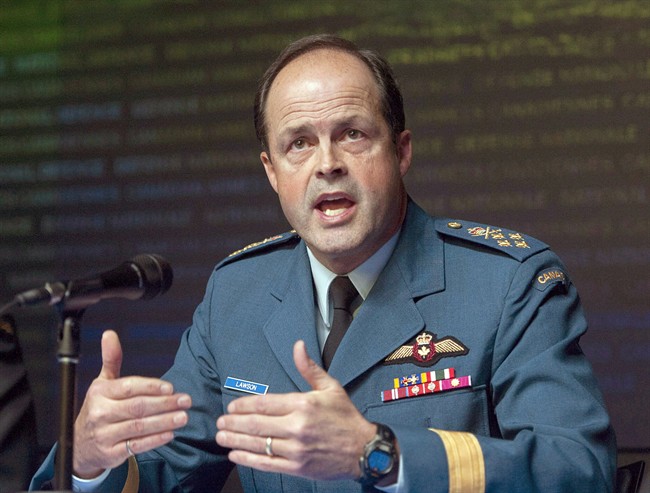TORONTO – Amid criticism of the Canadian military’s handling of mental health within the ranks, the country’s top general hopes a new video series will help families living with a Canadian Forces member suffering from operational stress injuries (OSI).

Gen. Tom Lawson, the country’s chief of defence staff, helped introduce the video series Wednesday, The Mind’s the Matter, along with the CEO of The Royal Ottawa Health Care Group, George Weber.
The web-based videos are targeted to teenage children and spouses with the goal of providing real-life scenarios and coping strategies, focusing on areas such as stigma, caregiver fatigue and destructive behaviour as a result of coping with mental health problems.
While participating in the “Connecting Communities of Care” forum on Wednesday, Lawson also highlighted other services available to military members and their families, including the Forces’ mental health resources guide.
“Operational Stress Injuries do not affect individuals alone, they impact entire families who must learn to understand and cope with the challenges presented by these injuries,” said Weber.
The military and federal government have been under increasing pressure to help Canadian soldiers and families struggling with mental health problems and the consequences of post-traumatic stress disorder (PTSD).
Family members of soldiers and veterans were in Ottawa this March to discuss the difficulties faced by spouses of veterans diagnosed with PTSD. They urged the Conservatives to recognize the role family members of veterans play, when Canadian Forces members go overseas, and when they return home. Many family members, they said, are suffering in silence.
Following a spate of soldier suicides at the end of last year, Lawson released a video urging soldiers with mental illness to seek help immediately and reach out to friends, family and medical professionals.
“We each have a role to serve in identifying and assisting those affected by mental health concerns,” said Lawson.
“Don’t underestimate the direct, positive impact you can have as a leader, as a friend, or as a subordinate. We can all note changes in behaviour, we can all listen to each other, and we can all aid in seeking help.”
Lawson’s message came amid harsh criticism from politicians and veterans advocates that not enough is being done within the military to encourage soldiers to come forward with their mental health issues – many detailing the pressure soldiers face to keep quiet or risk losing their job.
In a special series about a mental health crisis in the military, soldiers and veterans told Global News that the fear is stopping a lot of Forces members from speaking up.
INVISIBLE WOUNDS: Crisis in the military
“People aren’t going to talk to you because they fear the repercussions,” said a sergeant in the military who spoke on the condition of remaining anonymous. The sergeant said people are afraid of losing their jobs, of facing the stigma surrounding mental health. He said this fear is also stopping a lot of people from seeking help from mental health professionals.
Retired Capt. Wayne Johnston, who was medically released from the military last month, also spoke about the potential career implications coming forward can have.
“You’re 25, your skill sets are you know how to fix bayonets…and destroy the enemy – so those are your skill sets. Where else am I going to employ those skill sets? Maybe I’d better sit on my hands and not say a word,” said Johnston.
Lawson’s new message comes as the government and Forces prepare for Friday’s National Day of Honour, which Prime Minister Stephen Harper designated as a day to commemorate Canada’s 12-year mission in Afghanistan.
As part of the commemorations, the last flag that flew over the Canadian mission will be presented to Harper and Lawson in Ottawa.
Lawson’s message also comes on the heels of accusations that the Department of National Defence (DND) has gone back on their word to a soldier suffering with PTSD.
READ MORE: Soldier who attempted suicide on fast-track for dismissal as DND breaks promise
Master Cpl. Kristian Wolowidnyk made headlines last year when it was revealed that he had attempted suicide after the military put him on the fast-track for release.
Wolowidnyk served in Afghanistan in 2009 and 2010. Because of his psychological injuries, Wolowidnyk was told he didn’t meet the Force’s universality-of-service standards, which require all Canadian Forces personnel to be able to deploy at any moment.
He said the moment the military told him he was being discharged because of his PTSD, he was devastated. On Nov. 21, 2013, two days after he learned of his pending dismissal, he tried to take his own life.
When Wolowidnyk went public, the military said they would extend his release as part of the Integrated Transition Program. But last week, he was told the offer had been withdrawn.
In a letter to Lawson and Defence Minister Rob Nicholson, Wolowidnyk’s wife Michele said the DND was simply putting off his case until the media glare died down.
-With files from The Canadian Press




Comments